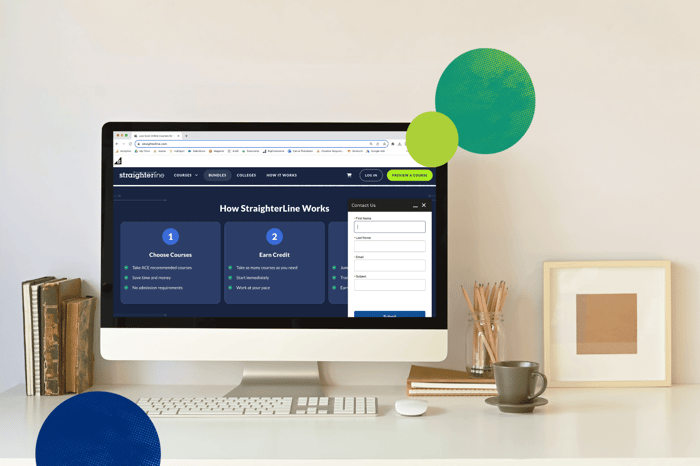By A.J. O'Connell It may not be the year of your big thesis, or the year you choose your major, but freshman year is your most important year of college, whether you’re there in person or attending school online. Why? Your freshman year lays the foundation for the rest of your college career; you develop your study habits freshman year, take your core classes, and choose the path that will take you to your degree. And of course, when you do well in your first classes, you’ll start college with a high GPA, which will set you up for success in future semesters. By starting off college strong, you'll get the most out of your degree program; you learn how to study well and you’ll save money later when you don’t have to add on additional semesters or retake classes.
How can I best prepare myself before starting my freshman year of college?
You shouldn’t just enroll in college and hope everything works out; although many high school graduates attend college, data from the National Center for Education Statistics shows that only 60 percent of college students complete their degree. It’s easy to get distracted in college – by the work, social issues, or concerns about balancing coursework and life. The most successful students have a plan for their college education; they start laying the groundwork for their college careers before freshman year even starts. This means taking an honest inventory of your resources and the resources that will support you at school. How is your mental health? Do you have the mental bandwidth to take on college courses right now? How much time do you have to devote to classes, and how are you at time management? What is your support network like at home and at school? Do your friends and family take your college plans seriously? What resources are available at your college to support you when you need help? You should also start creating a degree plan, so that you have a rough idea of the courses you’ll need to take (including all prerequisites) to get the degree you want in a timely fashion. To prepare for college, you may want to take an online course or two before enrolling in college to fill any gaps you may have in your education, like a math course or an English composition course. By taking these core classes ahead of time, you can then jump right into your degree plan.
Top 10 Study Tips for Your Freshman Year of College
So how can you make the most of your freshman year? Below is a list of important study tips that will help you be the best student you can be in your most critical year of college.
- Be a good communicator: It’s important to stay in touch with your professors, the financial aid office, and your fellow students. For one thing, it helps to get to know faculty and staff before you have to contact them with a problem. For another, it will make it less intimidating for you to contact your professor when there is a problem. A common mistake students often make is not telling a professor if they won’t be coming to class one day, or if they don’t think they can turn in an essay by its due date. When I taught college classes, I often heard from students who’d gone silent that they didn’t want to give me bad news about an assignment because they thought I’d be upset. Most professors know work is going to be late sometimes. By talking to your instructor as soon as you know there’s an issue with an assignment, you can keep them in the loop and possibly work out a plan to turn in assignments later without penalties.
- Know your schedule: Your instructors hand out syllabi for a reason – so that you know what will be covered in class and when things are due. Look through all your syllabi at the start of class and map out your time. Know when classes meet, when big projects are due and when your exams are. Knowing now will help you manage your time later.
- Manage your time well: Time management can be pretty tricky for college students. Be honest with yourself. How much time do you have for each class? Can you fit your work into that time? Don’t be afraid to use time management tools and apps if you don’t think you can manage your time on your own.
- Do the reading: Reading is a huge part of the college course experience, but sometimes the material is pretty dry. Read it anyway, and if you’re having a hard time reading, skim each section and take notes. A familiarity with the reading will help you later, when you’re expected to participate in class discussions.
- Ask for help when you need it: There’s no shame in seeking help. If you don’t understand something, talk to the professor, or head to the tutoring center. College is a community; you’re not expected to learn everything on your own.
- If there’s an orientation, attend: You might be tempted to skip social events, like orientations or mixers, but it’s important to get to know your instructors, advisors, and fellow students. You’ll be with many of these folks through your entire college experience. This is the time to learn names and get to know one another.
- Learn to take excellent notes: Even if you’re taking an online course with recorded lectures, there’s no substitute for note-taking. For one thing, you’re not going to want to relive an hour long lecture to find the relevant parts while you’re studying – note taking helps you remember the important pieces. For another, note-taking actually improves your memory. Researchers found that students who take notes by hand remember and learn information more thoroughly than those who take notes on laptops.(One theory is that people who take notes by hand put the notes into their own words while those who type notes often type lectures verbatim.) However, even if you take notes on a computer, note-taking is critical in college.
- Start preparing for exams early: Cramming for a test is never easy, and is rarely effective. Learn how to study well. Rather than trying to learn everything all at once during midterms and finals, prepare a little at a time, assembling notes and reading and anything that might help you on the test. When you learn over a long period, you’re more likely to remember information you’ll be tested on.
- Map out a degree plan: While many schools will ask you to choose a major after freshman year, it’s important to start thinking of your degree as soon as possible so you can map out all the classes you’ll need to take, and in what order. Some classes aren’t available every semester, so it’s important to have a rough idea of what classes you’ll need at the start.
- Don’t be afraid of outside resources: If you need a class that isn’t being offered one semester, or you want to get a jump start on another class you might have to take later, don’t be afraid to fulfill the requirement with an online class from an outside source. StraighterLine, for example, offers courses that are accepted for credit by our more than 100 partner schools.
Why is freshman year so important?
Starting your freshman year strong means starting your college education strong. It’s an opportunity to get your grades up early, develop good study habits, and prepare a plan for doing well as you earn your degree. By taking the time to prepare yourself, you’ll develop a set of skills that will help you go a long way your first year and beyond in college. Thinking about earning your degree at a college or a university? Read this article on the Advantages of Online Learning and learn why online learning might just be the most flexible and affordable way to get started.












